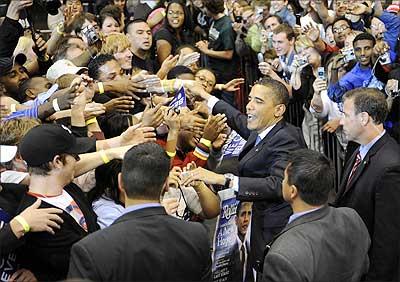|
|
| Help | |
| You are here: Rediff Home » India » News » First Look |
|
 From a dark horse in the Democrat race to the first black US presidential candidate from a major party, Barack Obama has had a meteoric rise from political obscurity to be at a sniffing distance of the White House.
From a dark horse in the Democrat race to the first black US presidential candidate from a major party, Barack Obama has had a meteoric rise from political obscurity to be at a sniffing distance of the White House.
The 46-year-old Harvard-educated first-time Senator from Illinois had a prolonged bitter battle with powerful Democrat rival Hillary Clinton for winning the nomination -- a roller-coaster run that was dominated by frequent controversies, mostly related to his race and religion.
Son of a father who travelled from a small Kenyan village to pursue University education in Hawaii and went on to marry a white woman from Kansas, Obama started his political career as a low-paid community organiser.
The Columbia University graduate and the first African-American president of the Harvard Law Review served for eight years in the Illinois state Senate. In 2004, he entered the Capitol Hill after a landslide Senate election victory and soon became a media darling and one of the most visible figures in Washington, with two best-selling books to his name.
The father of two young daughters, who appeared with his wife Michelle to declare victory before a cheering crowd in St Paul, described it as a "defining moment" for the nation which abolished slavery 200 years ago but is still battling the scourge of racial discrimination.
"Tonight we mark the end of one historic journey with the beginning of another -- a journey that will bring a new and better day to America," Obama, who projected himself as a candidate for "change", said.
"America, this is our moment. This is our time. Our time to turn the page on policies of the past," he pledged.
There were reports earlier that Clinton would concede, but her campaign said she was "absolutely not" prepared to do so.
Clinton praised Obama warmly in an appearance before supporters in New York. But she neither acknowledged Obama's victory nor offered a concession of any sort.
"This has been a long campaign, and I will be making no decisions tonight," she said. Instead, the 60-year-old said she would spend the next few days determining "how to move forward with the best interests of our country and our party guiding my way."
US media reports quoted lawmakers as saying that during a conference call Clinton expressed willingness to serve as Obama's running mate in November if she was asked to.
The Obama campaign, however maintained that it was "too early" to discuss the issue. "We don't have a long list or a short list," said David Axelrod, Obama's chief strategist.
"Obviously she's an incredibly formidable person."
Obama supporters gathered in large numbers outside a convention centre in St Paul. Festive mood prevailed all over as Obama walked in with wife Michelle amid loud cheers in an arena draped with huge American flags and the trademark "Change We Can Believe In" banners.
Diving into general election mode, Obama took on presumptive Republican nominee John McCain, saying it's "time to turn the page on the policies of the past."
The 71-year-old Vietnam war veteran also did not mince his words while addressing a gathering in Louisiana, the home state of Indian-American Governor Bobby Jindal who has been apparently short-listed for Republican vice-presidential nominee.
"No matter who wins this election, the direction of this country is going to change dramatically. But the choice is between the right change and the wrong change, between going forward and going backward," McCain said.
Obama, however, said "It's not change when John McCain decided to stand with George Bush [Images] 95 per cent of the time, as he did in the Senate last year."
After their respective party conventions in August and September formally nominates them, the two candidates will vie to succeed President George W Bush [Images], who has seen his popularity dip in opinion surveys amid fears of an economic recession and criticism over the handling of Iraq war.
Analysts feel the Bush legacy can hurt the chances of McCain but he may gain from the divisions that emerged within the Democrats during the epic nominating battle that drew record turnouts in primary after primary - more than 34 million voters in all.
Obama won a stunning victory in the first contest, the Iowa caucuses in January. Clinton came back with an upset five days later in New Hampshire.
They traded victories through the Super Tuesday contests on February 5, when almost half the states voted. Then Obama had 11 straight victories and the Clinton campaign never fully recovered.
Obama drew his strength from blacks and younger, more liberal and wealthier voters in many states. Clinton was preferred by older, more downscale voters, and women.
The African-American Senator, the son of a Kenyan man and a white woman from Kansas, has a tough task ahead in a country where race remains a bitterly divisive issue.
Clinton appeared to be playing up race factor during the primaries by insisting she would be the strongest candidate to beat McCain, pointing to Obama's problems attracting working-class white voters.
Image: Barack Obama amid a sea of supporters during a rally at
Photograph: AFP PHOTO/Emmanuel Dunand
|
|
| © 2008 Rediff.com India Limited. All Rights Reserved. Disclaimer | Feedback |